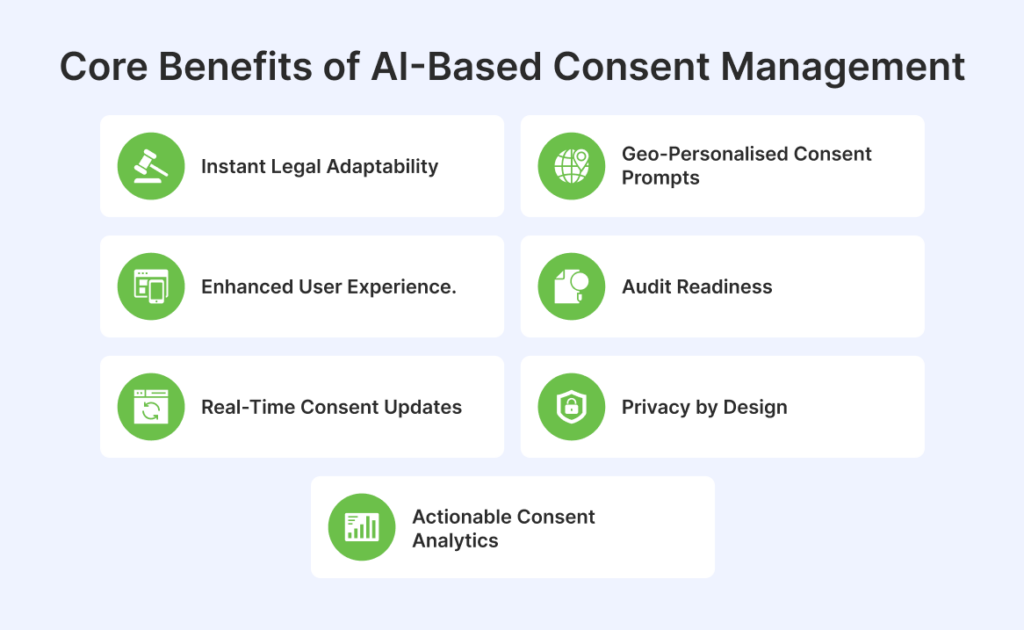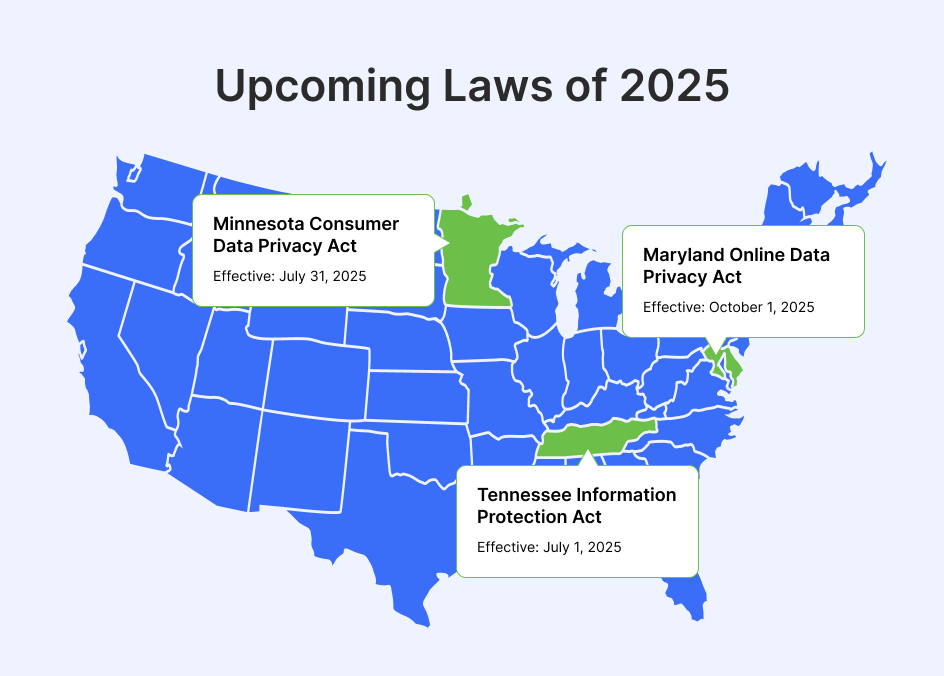Is your website ready to handle the growing complexity of global privacy regulations in 2025? With laws constantly evolving across jurisdictions like the EU, US, and beyond, businesses can no longer rely on traditional cookie consent tools. Static banners and one-size-fits-all policies are failing to meet today’s data privacy standards.
AI is stepping in as the game-changer. From adaptive compliance mechanisms to dynamic consent prompts, AI is transforming how organisations manage cookie tracking while aligning with strict regulations like GDPR and CCPA. This is where smart, automated consent management systems are proving essential.
This blog explores what AI cookie consent management is, why it’s needed now more than ever, and how businesses can stay compliant across multiple legal frameworks. We’ll also cover the key features of an AI-powered consent management platform, the most recent legal updates in 2025, and what to expect next.
Whether you’re a global enterprise or a fast-scaling startup, this guide will show you how to future-proof your data privacy efforts with AI.
AI cookie consent management refers to the use of machine learning and automation to manage user data consent in real-time. These platforms leverage algorithms to detect, classify, and govern cookies based on active legal requirements across various regions.
Unlike traditional tools, an AI-powered consent management platform adjusts dynamically. It can deliver tailored banners, log consent actions, and apply changes as soon as laws evolve. That means less manual intervention and stronger legal protection.
Combining these AI-powered solutions with privacy policy generation software, cookie scanners, or consent logs gives a smooth compliance solution. Since the tools run on real-time updates, adapting to situations, they serve well for organisations that need to cater to different privacy laws across countries.
Lorem ipsum dolor sit amet, consectetur adipiscing elit. Ut elit tellus, luctus nec ullamcorper mattis, pulvinar dapibus leo.
In 2025, businesses face a growing challenge: staying aligned with data privacy regulations that vary by jurisdiction and evolve frequently. Manually updating cookie banners or compliance workflows is no longer feasible.
AI compliance tools for websites are uniquely equipped to handle this complexity. They automatically update consent mechanisms according to:
By using AI in legal compliance, businesses can minimise risk and increase operational efficiency without sacrificing user trust.
The General Data Protection Regulation (GDPR) remains a cornerstone of privacy law in the EU and UK, especially post-Brexit. It imposes strict requirements on how businesses must handle cookies, data consent, and privacy. AI-based cookie consent management tools play a crucial role in ensuring compliance across these regions.
Key points include:
AI-powered cookie consent management platforms automatically handle these nuances by adjusting banners, tracking user preferences, and ensuring consent logging is compliant with both EU and UK versions of GDPR.
The California Consumer Privacy Act (CCPA), alongside its update, the California Privacy Rights Act (CPRA), has set a precedent for privacy laws in the United States. However, the landscape is rapidly evolving, with multiple states passing their own data privacy laws. AI-driven consent tools are pivotal for managing the various models and regions.
Key points include:
AI-driven consent management tools help businesses stay compliant by automatically detecting the user’s state and adjusting consent mechanisms based on local laws, such as offering an opt-out option for California residents and an opt-in option for others.
Outside of the EU and the US, several countries have introduced or updated their privacy laws in ways that directly impact cookie consent practices. For international businesses, AI cookie consent management systems offer the ability to localise compliance quickly while maintaining a consistent user experience.
Other countries are also tightening their laws. South Korea’s Personal Information Protection Act (PIPA) enforces strong consent requirements and penalises non-compliant data handling. Japan’s Act on the Protection of Personal Information (APPI) requires that users be notified and grant consent before cookies can be used for behavioural tracking. Businesses relying on manual updates or static solutions will struggle to keep up, whereas AI-driven systems can meet these standards efficiently.

Your consent platform should automatically detect and classify cookies on your website. This includes differentiating between strictly necessary, performance, functional, and targeting cookies.
The solution must support dynamic legal updates and multiple jurisdiction rules. A powerful compliance engine ensures you stay aligned with complex data privacy regulations.
Centralised dashboards offer visibility into user consent actions. Automated logs and version control make reporting seamless and legally reliable.
Businesses need seamless integration with CMS, eCommerce platforms, and third-party tools. The platform should be intuitive for users and developers alike.
Several new state and national privacy laws are set to come into effect in 2025, requiring businesses to adapt quickly. AI cookie consent management platforms will be essential for automating these updates.

This law introduces new consumer rights, including the right to access, delete, and opt out of the sale of personal data. AI solutions will need to adapt consent mechanisms accordingly.
This law provides similar provisions to the CCPA, allowing users to opt out of data sales and manage their consent preferences. AI cookie consent platforms will automatically adjust for users in Minnesota.
This law establishes consumer rights related to access and deletion of data. Businesses must ensure that their AI consent management platforms are ready to manage consent withdrawals, data requests, and updates.
These updates highlight the increasing need for AI-powered consent management tools that can handle the complexities of multiple jurisdictions and evolving privacy laws. By leveraging AI, businesses ensure compliance while offering users a better experience, staying ahead of regulatory changes, and managing cookie-tracking compliance.
Data privacy regulations are evolving too rapidly for manual compliance to keep up. As of 2025, AI is not a luxury but a necessity in consent management. Static banners and outdated CMPs will put businesses at risk.
Forward-thinking organisations are embracing AI cookie consent management guides to ensure full legal coverage, a better user experience, and long-term data protection.
Ensure your website meets evolving global privacy laws—experience the power of Seers AI for smarter, automated cookie consent today. With a smart AI system powering your consent management, you’re not just complying—you’re leading.
To meet CCPA cookie compliance, websites must provide US visitors with clear opt-out options and full transparency on data use. A multi-regulation cookie solution helps by adapting cookie banners automatically. Using an AI compliance tool for websites ensures these banners reflect CCPA rules in real-time, aligning with both US and international privacy standards.
An automated cookie banner detects a user’s location and delivers the appropriate consent prompt based on local data laws like GDPR or CCPA. Integrated with consent management software, it streamlines consent tracking and reduces manual errors. This tool is key for managing cookie consent for US and EU laws effectively and efficiently.
Consent management software automates the capture, storage, and updating of user consent data. It supports compliance with global privacy laws such as GDPR and CCPA. When combined with an AI compliance tool for websites, it enables dynamic updates and audit readiness, all while enhancing user trust and simplifying legal risk management.
Yes, a multi-regulation cookie solution can manage cookie consent for US and EU laws within a single platform. These tools deploy automated cookie banners and leverage AI compliance capabilities to adjust to regional requirements. This approach ensures consistent consent practices across all users and simplifies legal compliance for international operations.
A GDPR cookie consent tool helps websites comply with EU data protection rules by managing user permissions for cookies. It presents region-specific prompts, stores user preferences, and integrates with consent management software for full legal coverage. When part of a broader AI compliance tool for websites, it also adapts dynamically to law changes across jurisdictions.


United Kingdom
24 Holborn Viaduct
London, EC1A 2BN
Get our monthly newsletter with insightful blogs and industry news
By clicking “Subcribe” I agree Terms and Conditions

Seers Group © 2026 All Rights Reserved
Terms of use | Privacy policy | Cookie Policy | Sitemap | Do Not Sell or Share My Personal Information.